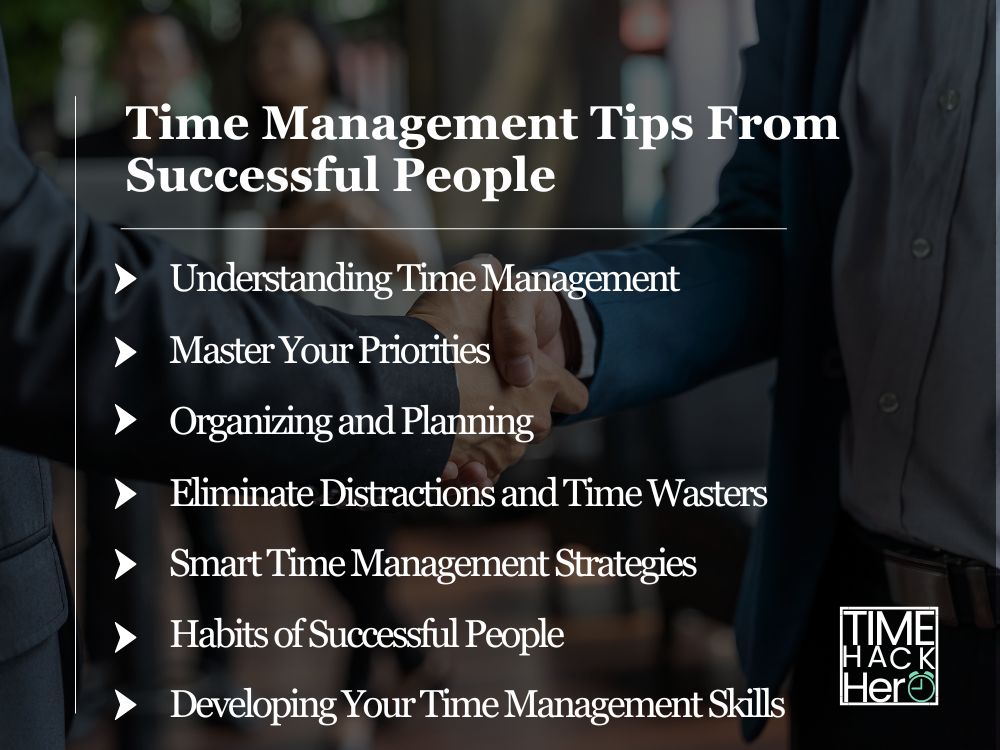Time management is a crucial skill that many successful people have mastered in order to maximize their productivity and achieve their goals. Efficient time management allows individuals to accomplish more in less time, reduce procrastination, boost confidence, and advance in their career or education. By observing the habits of successful people, we can glean valuable insights and incorporate these time management strategies into our own lives.
One of the key components of effective time management is structuring your day with intention. Successful people often start their day with a plan that outlines the tasks they want to accomplish, allowing them to allocate their time accordingly. Another useful strategy is timeboxing, which involves allotting a specific amount of time for each task, creating a focused and goal-oriented work environment.
Adopting such time management strategies not only helps us to stay organized and make the most of our time, but also promotes a better work-life balance, reducing stress and burnout. By learning from the habits of successful people and implementing these tips, we can enhance our own time management skills and optimize our personal and professional lives.
Table of Contents
Understanding Time Management
Importance of Time Management
Time management is a crucial aspect of achieving success in both personal and professional contexts. By efficiently utilizing time, individuals can accomplish more and set goals more effectively. Good time management enables you to prioritize and allocate time for essential tasks, allowing you to stay ahead of deadlines and minimize distractions.
Productivity and Efficiency
When it comes to productivity, time management plays a significant role. By implementing time management techniques, you can increase productivity by minimizing wasted time and focusing on important tasks. Such techniques include setting realistic goals, creating a daily or weekly schedule, and breaking down large tasks into smaller, manageable parts. This allows you to focus on one task at a time, avoiding multitasking and reducing the time spent on less important activities.
Reducing Stress
Managing time efficiently not only improves productivity but also helps in reducing stress. When you are organized and have a clear understanding of the tasks ahead, it becomes easier to allocate sufficient time for each responsibility. This enables you to meet deadlines without feeling overwhelmed or overworked. Effective time management techniques like delegating responsibilities, setting priorities, and taking breaks can help you manage your workload. By doing so, you will experience reduced stress levels and an enhanced sense of accomplishment.
Master Your Priorities
There are several approaches to help you master your priorities for successful time management. In this section, we will explore three important techniques: Eisenhower Matrix, Urgent vs. Important Tasks, and Setting Goals.
Eisenhower Matrix
The Eisenhower Matrix is a prioritization method based on categorizing tasks into the following four categories:
- urgent and important (do first)
- important, but not urgent (schedule)
- urgent, but not important (delegate)
- neither urgent nor important (eliminate)
This method helps in identifying the tasks that require immediate attention and those that can be scheduled or delegated. A visual representation of the Eisenhower Matrix can drive better focus:
| Urgent | Not Urgent |
|---|---|
| Important | |
| Do First | Schedule |
| Not Important | |
| Delegate | Eliminate |
Urgent vs. Important Tasks
Distinguishing between urgent and important tasks is crucial for effective prioritization:
- Urgent tasks are time-sensitive and demand immediate action, such as deadlines or emergencies.
- Important tasks align with your long-term goals or have a significant impact on your overall success.
It’s essential to set priorities based on the significance of tasks and execute them accordingly. Handling urgent tasks first helps in reducing stress and allows you to focus on essential tasks effectively.
Setting Goals
Establishing clear goals is another vital step in time management:
- Define your goals: Specify what you want to achieve, both in the short and long term. Make your goals relevant and attainable.
- Break down your goals: Divide your larger goals into smaller, manageable tasks or milestones, which make them less overwhelming.
- Prioritize tasks based on goals: Organize tasks that support your goals and prioritize them accordingly. Incorporate the principle of the Eisenhower Matrix to determine which tasks to tackle first.
- Track progress: Regularly evaluate and measure your accomplishments to ensure you’re making progress towards your goals, adjusting your priorities as needed.
By mastering your priorities using the Eisenhower Matrix, distinguishing urgent and important tasks, and setting clear goals, you can effectively manage your time and increase your productivity.
Organizing and Planning
To-Do Lists and Scheduling
Creating and maintaining to-do lists is an essential part of organizing and planning your time. They help in prioritizing tasks, setting deadlines, and keeping track of your progress. Consider using a combination of physical and digital tools, such as calendars, notebooks, and apps. By doing so, you can create a system that works best for your needs. Make a habit of reviewing and updating your to-do lists regularly.
Scheduling is crucial in time management, as it enables you to allocate specific time frames for your tasks and helps avoid procrastination. Plan your day, week, or even month by blocking out time for different tasks, ensuring enough time for important projects and some flexibility for unexpected situations. Consistently setting and sticking to a schedule can also help you achieve a balance between work and personal life.
Using Time Management Tools
Many time management tools are available to help you with organizing your tasks, managing projects, and tracking your progress. Some popular options include:
- Calendars and planners: Useful for visualizing your day, week, or month, and setting deadlines.
- Notebooks and journals: Helps in jotting down ideas, tasks, and other relevant information.
- Time trackers: Enables you to analyze your time spent on tasks and improve efficiency.
- Task manager apps: Assist in organizing and prioritizing tasks, setting deadlines, and notifications.
Experiment with different tools and find the ones that complement your workflow and preferences best.
Project Management Approaches
Adopting a project management approach allows you to break down large tasks into manageable chunks, set milestones, and allocate resources effectively. Some popular project management methods are:
- Agile: A flexible approach, focuses on rapid delivery and continuous improvement.
- Waterfall: A linear approach, follows a sequence of phases, each completed before moving on to the next.
- Kanban: A visual approach, uses a board with columns to represent different stages of a project.
Choose the method that aligns with your goals and management style, and apply it to your projects to boost productivity and organization.
By combining effective to-do lists, scheduling, time management tools, and project management approaches, you can enhance your planning and organization skills and make the most of your available time.
Eliminate Distractions and Time Wasters
To excel in time management and boost productivity, one must learn how to eliminate distractions and time wasters. This section covers valuable strategies for overcoming procrastination, managing emails and communication, and avoiding multitasking.
Overcoming Procrastination
Procrastination undermines productivity and timeliness. To keep it at bay, consider the following techniques:
- Break tasks into smaller pieces: By breaking tasks into smaller, more manageable parts, they become less overwhelming.
- Set achievable goals: Establish short-term, specific goals to stay focused and motivated.
- Use a timer: Employ a timer to maintain awareness of time spent on tasks and encourage timely completion.
- Establish designated “distraction times”: Allocating specific times for distractions allows you to concentrate more effectively during work periods.
Managing Emails and Communication
Proper email and communication management ensures that distractions are minimized. Adopt these strategies for improved time management:
- Set specific times for checking email: Reserve specific periods throughout the day to check and respond to emails, rather than continuously monitoring your inbox.
- Prioritize emails: Sort emails by importance, and deal with urgent matters first.
- Limit unnecessary communication: Only include necessary recipients in email communications to streamline discussions and avoid information overload.
Avoid Multitasking
Contrary to popular belief, multitasking often reduces productivity. To focus on one task at a time, follow these tips:
- Organize tasks based on priority: By sorting tasks according to importance, it’s easier to concentrate on one at a time.
- Eliminate distractions: Remove any potential interruptions, such as closing unnecessary browser tabs or silencing phones, to focus solely on the task at hand.
- Schedule dedicated time for each task: Allocate specific sections of time to each task, which prevents the urge to multitask and helps maintain focus.
Smart Time Management Strategies
Time Blocking
Time blocking is a valuable time management strategy that involves scheduling your day into blocks dedicated to specific tasks. By allocating your time in this manner, you can set boundaries, reduce distractions, and increase focus on the task at hand. To implement time blocking, follow these steps:
- Identify your priorities: Recognize the essential tasks you need to complete and prioritize them.
- Estimate time required: Evaluate the amount of time you anticipate each task will take to complete.
- Create time blocks: Allocate specific time frames in your schedule for the prioritized tasks.
- Stick to the schedule: Commit to the designated time blocks and avoid multitasking.
Pomodoro Technique
The Pomodoro Technique is a popular time management method that breaks your work into short, focused intervals (usually 25 minutes) called “Pomodoros.” Each Pomodoro is followed by a short break, typically around 5 minutes. After completing four Pomodoros, take a longer break. This method helps maintain focus, reduce burnout, and enhance productivity. To use the Pomodoro Technique:
- Choose a task: Select a task or project to work on.
- Set a timer: Set a timer for 25 minutes (one Pomodoro interval).
- Work undisturbed: Work on the task without distractions until the timer goes off.
- Take a break: Enjoy a 5-minute break after each Pomodoro, and a longer 15-30 minute break after four Pomodoros.
Adapting and Rearranging
Adapting and rearranging your schedule is a key time management skill that revolves around flexibility and awareness. It involves evaluating your current tasks as well as adjusting your schedule based on changing priorities and circumstances. To practice adapting and rearranging:
- Assess progress: Regularly assess your progress on tasks and projects.
- Reevaluate priorities: Determine if your priorities have shifted and need to be readdressed.
- Adjust your schedule: Modify your schedule as needed, whether it’s moving tasks, reallocating time blocks, or rescheduling meetings.
- Embrace change: Recognize that change is inevitable and growing comfortable with adjustments will improve your overall time management capabilities.
Habits of Successful People
Richard Branson’s Time Management Advice
Sir Richard Branson, the founder of the Virgin Group, emphasizes the importance of waking up early to have a productive day. He believes that starting the day early allows you to successfully prioritize tasks, have time for exercise, and handle any unforeseen issues that may arise. This also helps in giving more time for oneself and setting a proactive tone for the day.
The Power of Delegation and Breaks
Successful people understand the value of delegation by leveraging the skills and strengths of those around them to achieve their goals more efficiently. Delegation frees up time to focus on important tasks that require their unique expertise. Furthermore, successful people recognize the need for breaks. Arianna Huffington takes time to ‘pause’, making sure to have breaks during the day, especially for meals.
Work-Life Balance and Well-Being
Maintaining a healthy work-life balance is essential for well-being and success. Successful individuals prioritize exercise, adequate sleep, and engaging in hobbies or interests that help them recharge. Promoting both mental and physical health allows them to manage their time and energy better, leading to increased productivity and overall satisfaction.
To summarize, adopting habits such as waking up early, prioritizing exercise, and implementing effective delegation, while ensuring regular breaks and maintaining a healthy work-life balance are key characteristics of successful people. By embracing these practices, individuals can significantly improve their time management and well-being.
Developing Your Time Management Skills
Continuous Improvement and Learning
Developing your time management skills is vital for continuous improvement and learning. One key aspect is prioritizing tasks effectively, focusing on both urgent and important tasks first. It’s essential to review and adjust your schedule regularly to adapt to changing conditions or priorities.
Implement various techniques to stay organized, such as:
- Using a to-do list or calendar
- Blocking out time for specific tasks
- Restricting unnecessary distractions
- Using breaks effectively
By staying organized, you will experience less stress and increased control over your time.
Career Success and Growth
Investing time in improving these skills has a direct impact on your career development. Good time management leads to increased productivity and efficiency, which is valued by employers and can lead to career growth.
To enhance your career success, ensure the following:
- Regularly set short and long-term goals
- Complete tasks and projects to the best of your ability
- Maintain positive working relationships with colleagues
- Seek opportunities for professional growth
Incorporating these practices into your daily routine will contribute to your career success and help you manage tasks effectively, leading to a healthier work-life balance.









